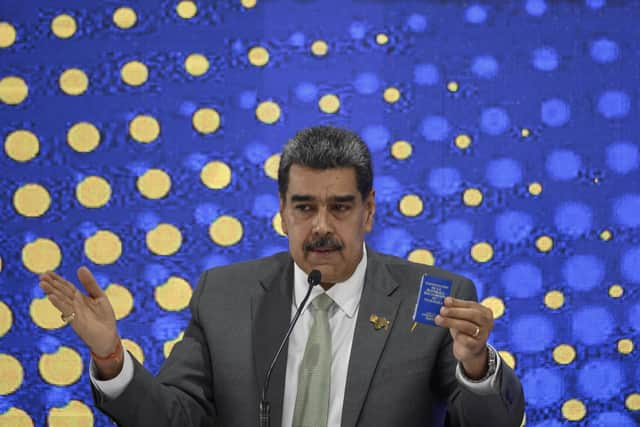Venezuela-Guyana: Why is Venezuela claiming ownership of oil-rich territory Essequibo and what has the UK got to do with it?
The Venezuelan president has made a move towards taking over a region of Guyana, sparking opposition from the Guyana government.
Following a referendum on Sunday, Nicolás Maduro has told his his state oil company to issue extraction licences in Essequibo, the oil-rich region governed by Guyana – and has proposed the National Assembly pass a bill making the area part of Venezuela.
Advertisement
Hide AdAdvertisement
Hide AdWhere is Essequibo?


The 61,600 square mile disputed territory borders Venezuela to the east and Brazil to the north east. It is rich in oil resources, which is one of the reasons Venezuela wants to claim control.
Why is Venezuela trying to take over Essequibo?
Venezuela has long laid claim to Essequibo. At the weekend, president Maduro held a referendum, which among other questions, asked Venezuelans if Venezuela should ignore the international arbitrators at The Hague, grant Venezuelan citizenship to Essequibo’s English-speaking inhabitants and convert the territory into a new Venezuelan state.
Despite a low turnout in the referendum, the result approved the establishment of a new Venezuelan state in the region.
What does the UK – and Scotland – have to do with it?
Guyana was previously controlled by the UK and only claimed independence in the 1960s. Dutch owned in the 18th century, Essequibo was taken over by British forced in 1796 and formally ceded to Britain 18 years later, along with nearby Demerara and Berbice. The three colonies united to become British Guiana in 1831.
British ownership of British Guiana was disputed by Venezuela, resulting in the country severing diplomatic relations with the United Kingdom in 1887. The United Kingdom and Venezuela went into arbitration with mediation from the United States, which resulted in the Paris Arbitral Award in 1899, ruled largely in favour of Britain.
Guyana was known as being one of the most Scottish of the British colonies.
Many Scots had become plantation owners in the three colonies when they were under Dutch control and at emancipation, Glasgow merchants held more wealth in British Guiana than in any other Caribbean colony.
What is the status quo in terms of control of Essequibo?
In 1966, the Geneva agreement was signed in a bid to resolve the conflict between Venezuela and the UK over the border between Venezuela and British Guiana. The treaty between Venezuela and the UK as well as what was then known as British Guiana, but soon afterwards became independent, was regarded as an “agreement to reach an agreement”.
Advertisement
Hide AdAdvertisement
Hide AdUnder the terms, the disputed region would remain under the authority of the government of Guyana until any other resolution was made under the treaty.
What has Guyana said about it?
In a Facebook address, Guyana's President Irfaan Ali said he had already spoken to the UN secretary general and is asking the UN Security Council to consider intervening.
"This is a direct threat to Guyana's territorial integrity, sovereignty and political independence," he said. "Guyana views this as an imminent threat... and will intensify precautionary measures to safeguard its territory."
The nation has put its defence forces on full alert.
Comments
Want to join the conversation? Please or to comment on this article.
